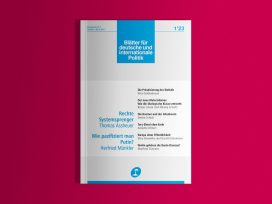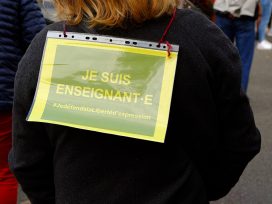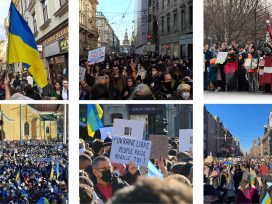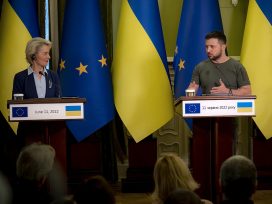After last year’s Islamist terror acts in France and Austria, the same old script could be observed being played out yet again. On the one side, there were those who accused Islam of being an intrinsically violent religion; on the other, those who argued that Islamist violence has nothing to do with the Muslim faith. This is a bit like responding to paedophilia in the Catholic Church either by shouting ‘Catholic bastards’ or by insisting that the teachings of Christ have nothing to do with child abuse. Neither leads anywhere. What the essence of a religion may be is of interest to theologians, historians of religion, and individual believers. But from the secular point of view, it is irrelevant.
What is relevant, however, is whether and how religions and religious hierarchies respond to violence committed in their name – not because this indicates whether they honour the foundations of their faith, but because it establishes whether they recognize the fundamental principles of civil coexistence. What concerns secularists is not the religious aspect of confessions, but their public role, their social and political impacts, and the use made of them by their adherents and representatives.
It is important that theologians and believers make an effort to reconcile their faith with the principles of democratic coexistence; this leads to the emergence of multiple interpretations of religious texts, thus generating pluralism. But attempts to justify human rights on the basis of an external authority should be treated with caution. Why do fundamental rights have to be compatible with holy texts before religions recognize them? Like any other cultural phenomenon, religions influence society and are influenced by it. In this game of give and take, laypersons (believers and non-believers) must stand their ground. Otherwise, fundamentalists will seize the advantage.
Conceiving of religions as social actors means understanding them as living components of society that are in constant evolution, and not as self-perpetuating monoliths, as fundamentalists would have them. This is to see religions for what they are, and to judge them on the basis of the contribution they make to democracy in the here and now. If, at a given historical moment and in a given social context, a religion plays a conservative and reactionary role, this does not mean that it can only ever do so. Nor does the fact that a religion has had an emancipatory role at a certain point in the past endow it with eternal democratic credentials.
What is certain is that no religion is immune to fundamentalism. And today, we are witnessing a spread of religious fundamentalism worldwide. In Europe, the biggest challenge to secularism is political Islam. The historian of Islam Olivier Roy has written that, ‘in view of immigration and the political situation in the Middle East, Islam contains a far more significant political dimension’ than other faiths. At the same time, however, Roy argues that French secularism expresses a specific fear of Islam. To support this assertion, Roy cites the example of conservative rabbis, who also hold misogynistic and homophobic positions, yet don’t arouse the same degree of alarm as conservative imams.
But this is entirely understandable. The social and political influence of conservative rabbis in France is clearly weaker than that of conservative imams. As a political force, ultra-orthodox Judaism – which is no less fundamentalist than Islamism – is not particularly relevant in Europe today. And while battles of principles and culture must be waged on all fronts, it is entirely legitimate that they focus on social forces that have real weight. This is why it is not only justified, but also necessary to criticize Islamism.
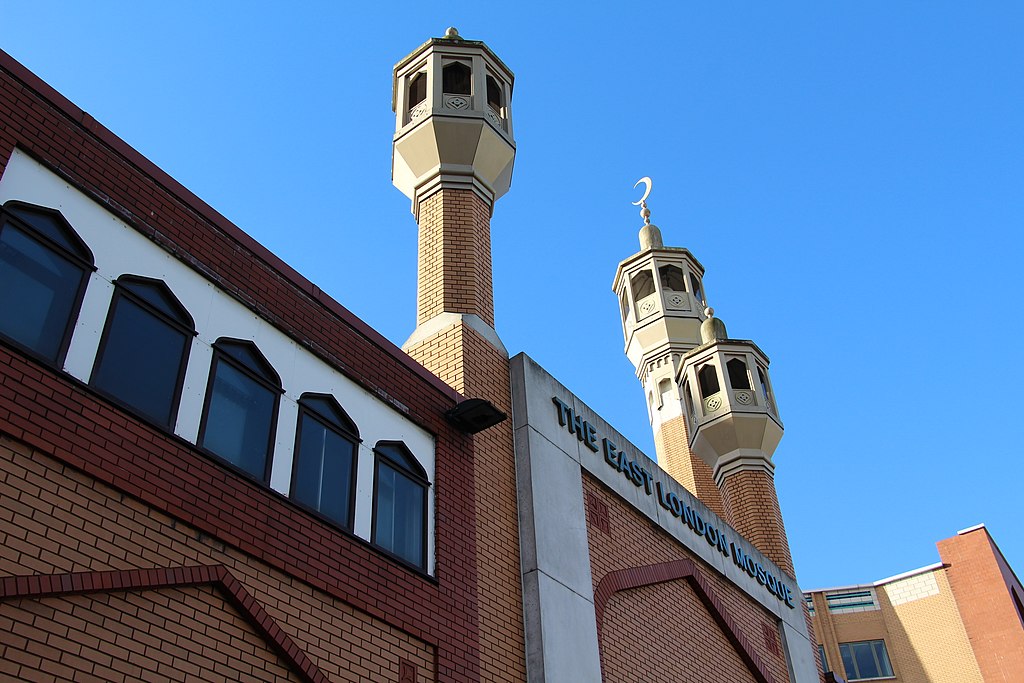
The orthodox East London Mosque. Photo by Fred Romero from Paris, France, CC BY 2.0, via Wikimedia Commons
Three types of Islam
The more complex societies become in religious terms, the more complicated the relationship between religion and state. Historically, European secularism is inextricably linked to the confrontation between Church – and particularly the Catholic Church – and State. But it needs to be asked whether the systems that European societies have developed to manage relations between state and religion (albeit imperfectly) still function when applied to other religions, in particular European Islam.
European Islam is relatively new. Its ongoing development follows complex paths that are often contradictory and far from monolithic. There are many forms of Islam in Europe. Some of them are perfectly compatible with a secular, liberal and democratic society, and others are less so – just as with any other religion.
Writing about ways of being a Muslim in France today, the sociologist Farhad Khosrokhavar distinguishes between an ‘Islam of integration’, an ‘Islam of exclusion’ and ‘radical Islamism’. The first is experienced not as membership of a group but as the ‘construction of a singular identify in the bosom of French society’. This is the most widespread, but also the least visible type of Islam, because the least militant. The Islam of exclusion, on the other hand, is ‘a form of neo-communitarianism based on the sacred, in which individuals … attempt to give meaning to their own existence by excluding themselves from a society in which they no longer see opportunity to be one of the “included”.’
Because of its ambiguity, the Islam of exclusion can pave the way towards the third type, namely radical Islam. But even when the Islam of exclusion remains non-violent, it creates divisions, without contributing to social cohesion. For a democratic and liberal system, this in itself is problematic.
The feeling of exclusion is determined by social and economic problems which, for historical reasons, significantly affect a large section of the Muslim population. Incontrovertible as this fact may be, however, it cannot be used as an excuse for the rejection of democratic norms. After all, religion can have a progressive or reactionary function in any context, including social and economic hardship. One cannot always invoke ‘structural’ conditions in order to be absolved.
One might object that Muslims of the second type – not to mention the third – are a minority, while the huge majority of Muslims in Europe are perfectly integrated into democratic society. From a social and political point of view, however, the extent to which a phenomenon is capable of influencing public discourse is just as important as its numerical quantity. Unfortunately, the silent majority of Muslims is just that. Their silence enables fundamentalists to occupy the public space and the collective imagination; or, in Gramscian terms, to obtain cultural hegemony.
To reject the essentialist principle means recognising the plural nature of European Islam. There is no one ‘Islam’, but many Islams. There is an Islam with a veil and one without; one with a beard and one without. There is an intimist Islam that excludes politics, and there is a political Islam that seeks to Islamize the public space. Christianity is no less varied. But while we are used to recognising distinctions in the Christian faith, we tend to think of Islam as a single bloc. This is because today, cultural hegemony is possessed by Islam’s most conservative adherents. They are the ones who ‘dictate the agenda’, not least through acts of violence; and it is their narrative that has become dominant.
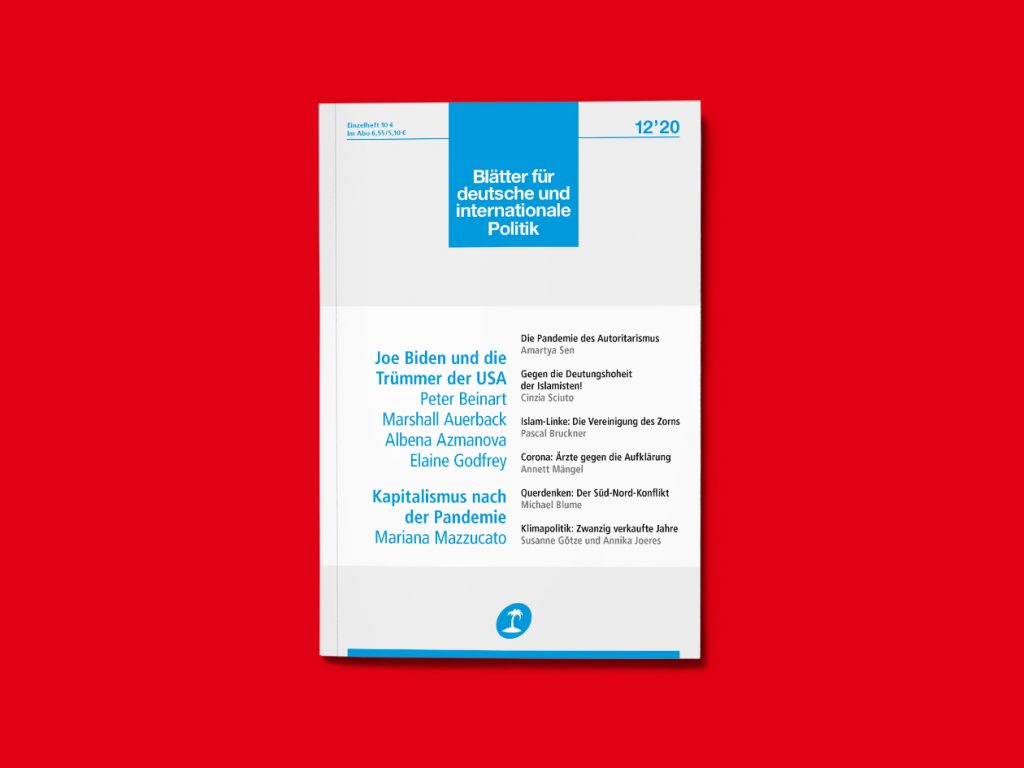
This article was first published in German in Blätter für deutsche und internationale Politik 12/2020. Read a review of the issue here.
Breaking the silence
To essentialize, homogenize and standardize is the typical strategy of fundamentalists. We must not play their game by reinforcing the image of a monolithic Islam. It is understandable that one’s capacity for making distinctions, for identifying variance, is greater when it comes to familiar phenomena. It is also understandable that the more distant a phenomenon is both culturally and geographically, the more blurred it becomes. But neither are justifiable. Above all, they are not justifiable with regard to Islam, which is no longer far away. On the contrary, Islam has become part of us. This requires us to know it in its many different forms.
In the Turkish constitutional referendum called by Recep Tayyip Erdoğan in 2017, Turks living abroad could also participate. In Germany, the turnout was less than half. But of those who did vote, the percentage in favour of the constitutional reform was well over sixty percent – over ten per cent higher than in Turkey itself. As the exiled opposition journalist Can Dündar pointed out, the low turnout showed that the majority of Turks in Germany are perfectly integrated and do not feel called upon to participate in the political life of the ‘motherland’. But the result also showed that the militant, conservative-reactionary minority is better organized. In such situations, historical responsibility falls on the silent majority. It cannot simply turn away with a shrug.
Social processes are always the result of interaction between structural conditions and subjective action. This is why it is essential that secular Muslims form associations, make themselves visible and try to influence public discourse. It should not be about distancing oneself, but about occupying a political and cultural space that is otherwise claimed by fundamentalists. It’s about cultivating the common good, about taking back cultural hegemony, about assuming responsibility towards a wider political and cultural community, and not just one’s own family or clan.
The visibility and political influence of secular Muslims in western societies is still too weak. This means that the most conservative Muslim associations can proclaim themselves the representatives of all Muslims. How this can happen is illustrated by events following the terrorist attack in London on 3 June 2017, when a van crashed into pedestrians on London Bridge, killing 8 and wounding 48. The sociologist Lamya Kaddor, a respected scholar of Islam and founder of the Alliance of Liberal Muslims in Germany, promoted a demonstration in Cologne, the motto of which was ‘#notwithus – Muslims and friends against violence and terror’. As Kaddor emphasized, this was an opportunity not to distance oneself from terrorism, but to take a stand against terrorism.
The demonstration was a complete failure. People explained their absence by saying that they didn’t feel the need to justify themselves as Muslims. Clearly, they had not yet understood that to demonstrate one’s position towards a problem that closely affects one, even if one is not directly responsible for it, is above all a signal to those – in this case Islamist fundamentalists – who will take advantage of one’s silence. Predictably, the Turkish-Islam Union of Religious Affairs (DITIB), the powerful association of Turkish Muslims in Germany, called for a boycott of the demonstration.
We see this mechanism at work in other contexts, too. For years, the argument ‘but it’s not my fault’ was used to justify Sicilians’ refusal to talk about the mafia. The majority weren’t mafiosi themselves; but their silence created the perfect environment for the proliferation of Cosa Nostra. It was only after the killing of the lawyers Giovanni Falcone and Paolo Borsellino in 1992 that Sicilians began to understand the need to demonstrate, to send a clear message to the mafia: ‘We are not like you and we will not allow you to humiliate our homeland. We are not your accomplices, not even in our silence.’
Another example is violence against women. While it is obvious that not all men are violent, it should be equally obvious that all men have a responsibility to resist a culture in which violence against women can develop. Men become accomplices of violence against women when they do not take action to change that culture. This complicity begins as soon as they make or laugh at a sexist joke. Here, too, it is not about distancing oneself from violent men – that would be too easy. Rather, it is about questioning oneself and others, of speaking up, in order to isolate violent men and show them that they are no longer accepted. Responsibility and even guilt results not just from actions, but also from inaction.
The instrumentalization of Islamophobia
After centuries of secular battles, criticism of the Catholic Church and of Christianity in general is now considered legitimate. Criticism of Islam, in contrast, is often met with accusations of ‘Islamophobia’. There can be no doubt that Islam is a minority religion in Europe and that Muslims are often subject to discrimination. However, to criticize not only the political use of a religion, but also a religion itself or religions in general, is a fundamental right that cannot simply be equated with intolerance towards religious adherents.
In order to understand how the term ‘Islamophobia’ is instrumentalized, it suffices to substitute ‘Christianity’ for ‘Islam’. Common at Gay Pride events are signs and slogans that are ferociously anti-religious and blasphemous, something that the Church is obviously not happy about. One might indeed consider these slogans inappropriate, tasteless, offensive and much more. But nobody who uses them has ever been accused of ‘Christophobia’, or hatred towards Christians as such.
With Islam, however, it is a different matter. When, at the London Gay Pride event in 2017, members of the Council of Ex-Muslims of Britain (CEMB) accused the East London Mosque of ‘inciting the murder of gays’, this was not a case of Islamophobia, as the mosque claimed. Vehement though the accusations were, underlying them was not a paranoid obsession with people of Muslim faith, but the fact that the orthodox mosque had in the past hosted preachers who had expressly praised the persecution of apostates and homosexuals. After all, the mosque could equally well have responded to the CEMB’s allegations with a libel suit.
Following the mosque’s protests, the organizers of Pride announced their intention to make inquiries into whether CEMB had violated the event’s code of conduct, and to evaluate the possibility of excluding CEMB from Pride. Fortunately, that never happened. But the fact that such a thing was even discussed is indicative of the climate created when Islam is criticized.
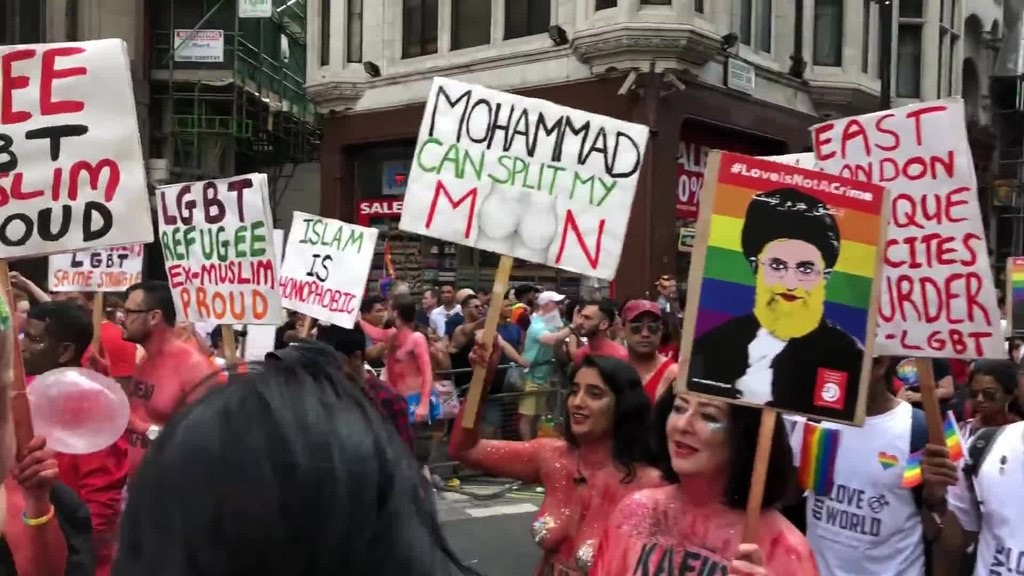
CEMB at London Pride in 2018. Photo by Nano GoleSorkh, CC BY 3.0 via Wikimedia Commons
Another common way to stifle criticism of Islam is the ‘but also’ argument: yes, there are homophobes among Muslims, but there are also homophobes among us. In other words, since ‘we too’ have the same problem, we don’t have the right to criticize others. But as soon as Muslims live here, they are no longer ‘them’ but ‘us’. Everyone has the right to criticize other subjects of the ‘us’ that makes up the political community – a community that is not religious or ethnic but constituted on a pact of coexistence. And when accusations of Islamophobia are thrown about indiscriminately, we lose sight of the real Islamophobes – who exist.
The word Islamophobia makes Islam a subject worthy of protection in itself. But rights can only be applied to people, not religions and ideas. By shifting attention from people to the faith they profess, the former become worthy of protection only by virtue of the latter: as Muslims, Christians, and so on, and no longer as people. All those who come from Muslim countries, but who are not themselves Muslims, become less deserving of protection. This is a daily experience for many atheist and apostate refugees, who often find themselves facing the same discrimination that they suffered in the countries from which they have fled.
It is unjust and intellectually dishonest to lump racists and xenophobes who have a problem with Muslims per se together with those criticize Islam and other religions in the name of democracy, equality and human rights. But above all it is extremely dangerous, and only plays into the hands of real racists. It is not hard to understand why fundamentalists may want to reduce everything to racism, but it is much less obvious why self-declared progressives would want to join this game. It is only the Islamists who stand to gain when the existence of xenophobia and racism serves as a pretext for silencing any and all criticism of Islam.
This article is based on excerpts from Cinzia Sciuto, Non c’è fede che tenga: Manifesto laico contro il multiculturalismo, Rome: Feltrinelli 2018.
